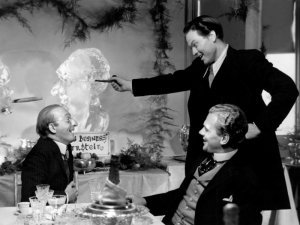Citizen Kane
The classic story about power and the press.

|
With the death of fabulously wealthy newspaper magnate Charles Foster Kane (Welles) in his cavernous mansion, a race begins amongst reporters to discover the meaning of his dying word, ‘rosebud’. Pursuing answers, one reporter (Alland) interviews Kane’s friends and associates, and pieces together his life in a series of flashbacks. After an impoverished childhood Kane rises to the head of a New York paper, which he runs with a naïve and idealistic charm. This gradually becomes transplanted by a ruthless desire for power, as Kane begins to manipulate public opinion and builds a media empire around himself, becoming even richer, marrying the President’s niece and finally running for political office. Yet, despite his power, Kane’s life begins to unravel; his relationships collapse as he manipulates the people around him as he had manipulated headlines. He withdraws to his enormous mansion, Xanadu, to die, where we finally discover the identity of 'rosebud.
Citizen Kane is widely regarded as one of the greatest films ever made, which in itself should be reason enough to see it. Welles is at his best, portraying Kane across his adult life and transforming effortlessly from fresh-faced young editor to exhausted media kingpin. Welles also wrote, directed and produced the film, and his influence is evident throughout. Partly biographical, and partly a damning critique of power and the loss of innocence, William Randolph Hearst, on whom Kane was partly based, was supposedly so infuriated by the film he banned his papers from ever mentioning it, and tried to bribe the studio to destroy the film. Shot in black and white, using pioneering camera techniques, and loaded with imagery, Citizen Kane remains as striking today as on its release, and as worth a watch as it ever was.
Lewis Bush
ARCHIVE
Citizen Kane is routinely described as the “best movie ever” in the press and it is very difficult to disprove this statement. From Citizen Kane’s atmosphere drenched opening scene, when the camera opens up the sinister and opulent mansion of Xanadu we are taken on a history of Charles Foster Kane’s life, as seen from five perspectives, those of his devoted assistant Bernstein (Sloane), college friend Jedediah Leland (Cotton) and other important people in his life. A picture is slowly built up of the media and financial tycoon rise to power and the effect it had on his life but does not help in answering the question raised by the opening scene. What did his last word “Rosebud” mean?
Citizen Kane is a stunning movie in almost all respects. Technically it uses cameramovements far ahead of it’s time and only now being paid homage to in movies such as Bryan Singer’s The Usual Suspects. Not only that but the multi-angled plot is also reminiscent of Tarantino and similar films such as Pulp Fiction and Go. But it doesn’t skimp on content either. The subject matter; the effect of power and wealth on one person packs a powerful punch, and the film shows brilliantly how both Kane and those relationships he is in suffer as a result.
Citizen Kane is not the most light-hearted film ever but like all great dramatic movies it mixes the dramatic plot with moments f light-heartedness and many quite profound and truthful moments (witness Bernstein’s “Girl on a ferry” speech). Although whether it is your vote for best movie ever will depend on personal taste but there is no denying it’s classic appeal and brilliance - and to think Welles was only twenty-five when he made it...
Matthew Francis
More Information | Back to Previous Schedule | This Season | BBFC Classification Guidelines
Screenings of this film:
| 1975/1976 Summer Term – (16mm) |
| 1982/1983 Spring Term – (16mm) |
| 1984/1985 Spring Term – (16mm) |
| 1991/1992 Autumn Term – (35mm) |
| 1999/2000 Spring Term – (35mm) |
| 2009/2010 Spring Term – (35mm) |
| 2018/2019 Autumn Term – (35mm) |
| 2021/2022 Autumn Term – (35mm) |
| 2021/2022 Autumn Term – (35mm) |


